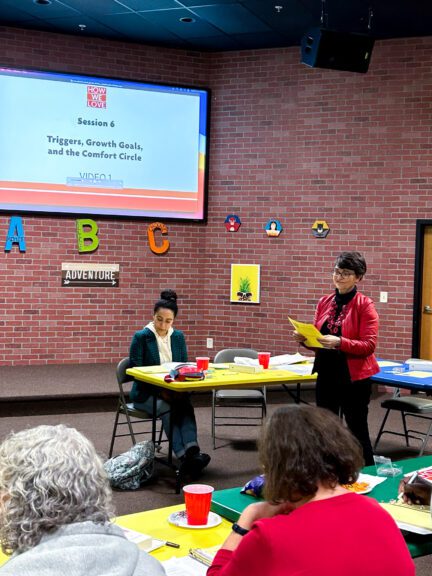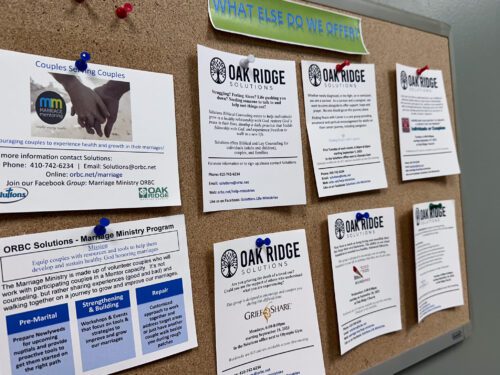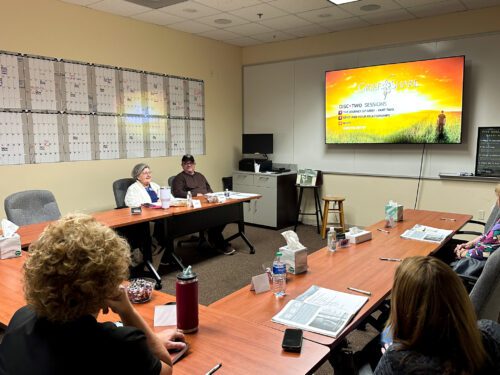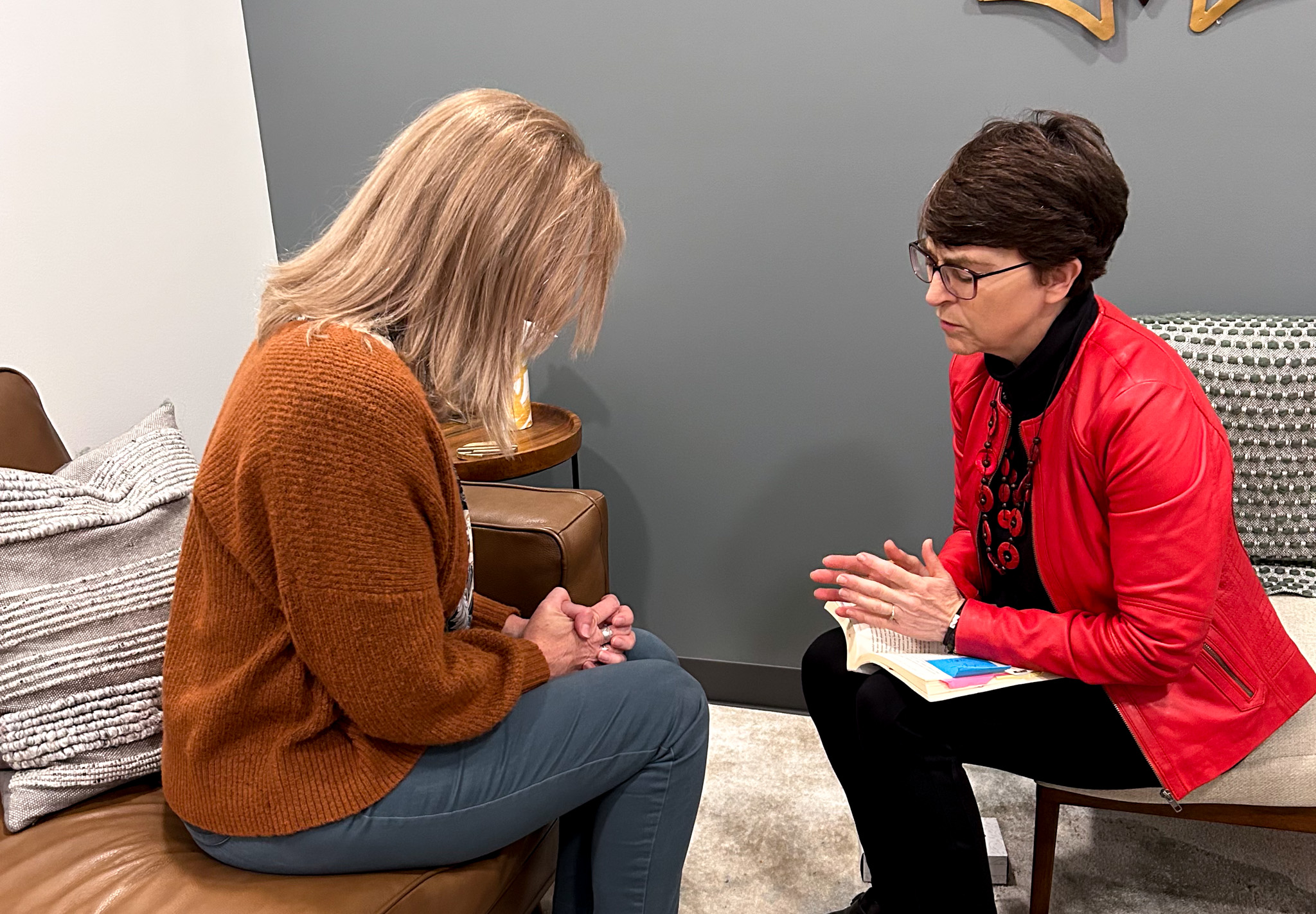SALISBURY, Md. — Health professionals warn of a growing mental health tsunami either upon us or coming, especially among the Gen Z generation. The World Health Organization reports, “Depression is one of the leading causes of disability. Suicide is the fourth leading cause of death among 15-29-year-olds. People with severe mental health conditions die prematurely – as much as two decades early – due to preventable physical conditions.”
Oak Ridge Church, Salisbury, (ORC) Lead Pastor Brian Moss called the situation devastating. “This is absolutely something we have to address,“ he said. ORBC has been addressing mental health challenges for over 15 years, which has evolved and is in a great spot to meet today’s needs. They developed a mental health ministry model that they say God has used to transform not only many people coming for help but those providing the counseling, and it has been catalytic in increasing membership. The church has a counseling ministry called “Solutions” that grew out of Celebrate Recovery. They currently have 18 counselors using five designated offices at the church to provide free mental health ministry services.
From “CR” to “Solutions”
He shared how “Solutions” originated in 1999 when a man attending Alcoholics Anonymous (AA) meetings at the church made a profession of faith. “He said I love the concepts (of AA), but I wish it were more Christ-centered. I had heard about Celebrate Recovery (CR) and told him, “Why don’t I send you to Saddleback? (CR began at Saddleback Church in 1991). He returned and said, ‘This is the best thing since sliced bread,’ and I said, ‘Let’s do it!” Moss said for years, ORC had the largest CR in the Mid-Atlantic region, and they offered training and hosted other churches.
Though CR was running well, in 2006, the same gentleman who began it said he felt called to another ministry in the church. He spent some time working with a prison ministry and at a halfway house and shared with Moss that he felt the greatest need in the area is affordable Christian counseling. He said there are just a few Christian counselors available near the church. Most were very expensive and didn’t accept insurance. Moss, agreeing, said, “I believe we can do better.”

Jeanette Hazel leads a “Solutions” care group. (Photo courtesy of ORC)
The church began partnering with the American Association of Christian Counselors (AACC) to provide training. Though many registered, the two-year intensive training was difficult; only five or six made it through. Those who became certified began taking on clients, but they needed more. Scott Elliott, a school counselor, became the director of Solutions in 2011. Elliott facilitated offering the courses for longer sessions for a shorter period, allowing more to complete the required classes in about nine months. Moss said that tweak made a difference, “In nine years, 60 people were certified as lay counselors, and 18 are still active in seeing clients. At first, counselors would wait until the evening when staff left the building and use church offices for counseling, but last year, when the church expanded with a new 20,000 square foot worship auditorium, they could relocate their offices into another building and allow counselors five offices. Clients come through a separate entrance.
Now, Solutions counselors see between 80-100 individuals each year. Leaning forward in his chair, Moss said, “One number that stands out, the one that I’m most excited about, is that 60% of the clients are not members. They’re coming out of the community.” Many seek help with marriage problems and issues with their children. With the high costs and lack of availability in the area, they had nowhere else to go, Moss said. “It has become a pretty cool assimilation ministry,” he said. Many people from the counseling session now call ORC their church home.
The next step in the ministry was moving people into care groups based on their needs. They have divorce care, GriefShare, parenting skills, boundaries, financial counseling, cancer groups, and others as needed. Trained counselors facilitate most of the groups. Moss shakes his head in wonder as he tells how God has worked through the Solutions ministry. Sharing one example of divine intervention, he said, “This blows my mind, and it happened twice on two separate occasions. A couple was divorcing and came to a money management counseling session, needing assistance on how to divide assets. They ended up reconciling their marriage!”
Elliott also gets excited about how God is working through the ministry. “We see people change right in front of our eyes. In a short time — nine sessions, you can watch them take steps and change. He gives the glory to God. “It’s not our job to fix them. Our job is to take their hand and take the hand of God and reunite that relationship. Once you begin to see that, you start to see them take steps of healing, faith, and self-confidence.”

A bulletin board at ORC displays flyers about various “Solutions” care group offerings. (Photo courtesy of ORC)
Elliott acknowledges, “We are limited, so we’re very transparent. Sometimes, we have to refer people out, and we’re okay with that. We are a springboard. We tell them mental health is important and say, let us get you where you need to be. Whoever calls us, we get them in the door at least once to let them know someone cares, hears them, and can pray for them. We put tools in their hands.”
Counselors Impacted by Ministry
Counselors are encouraged, and they grow in faith and professionalism, but sometimes, the trauma they hear can have an impact on their own lives. “They hear some hard stuff. I always go around the group and ask, ‘How are you guys doing personally and ministry-wise?’ Sometimes, we have to stop and help them unload. We’ll talk through the process, and I’ll follow up if they’re going through some heavier things.”
The counselors are from all walks of life — Elliott is a school counselor, and others are accountants, blue-collar and retail workers, and retirees. “Some have gone on to get licenses, one went to a local crisis pregnancy center, and one lady was trained and is working in the field of pet bereavement, helping families work through that process. I see them taking the tools they’ve learned here wherever they are called to serve.”

GriefShare is one of many care groups offered through ORC’s Solutions care groups. (Photo courtesy of ORC)
Elliott now has help in managing the teams. Janette Hazel coordinates the care groups. Michelle Hoffman supervises the counselors. Ryan and Angela Wagner oversee the marriage side of counseling — including training Christian married couples who have been married successfully for ten years or more to be able to counsel those married for shorter times and for pre-marital counseling.
Elliott said he loves watching God work and answer prayers. He has personally experienced help from the ministry. “I have benefited and gleaned from the knowledge of those around me. These aren’t just volunteers. We’re God’s church. “Four years ago, my wife (Liz) and I entered the foster care process and, five years later, into adoption. It was a rough, emotional process, and having counselors I could call and talk to during the process was a blessing. Our son is now four. “We are a family. We wipe each other’s tears.”
Feature photo: Jeanette Hazel and Michele Hoffman pray together. (Photos courtesy of ORC)


